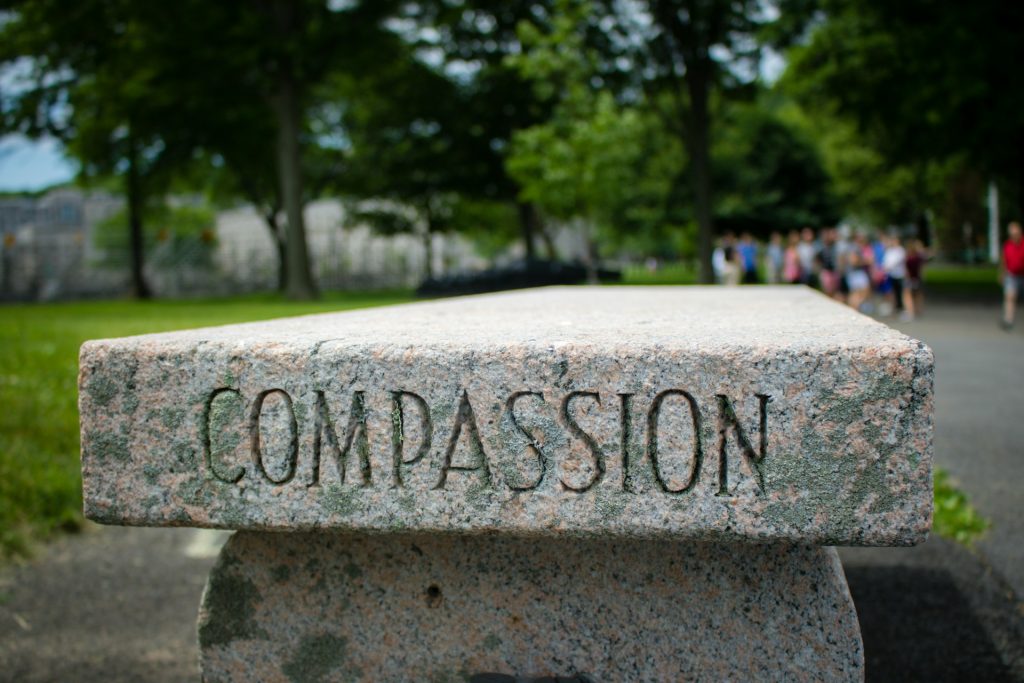
When most people hear the word “compassion,” they imagine softness.
A pitying glance. A hand on the shoulder. A weakness that slows you down in the fast, competitive world of achievement.
But compassion isn’t weakness. It’s not pity. And it’s not optional.
Compassion is strength. It’s the foundation of trust, the balance to courage, and the quiet force that makes fulfillment possible. Without it, your career, your relationships, and even your inner life collapse into transactions.
What Compassion Really Means
Compassion isn’t just “feeling for” someone. That’s pity. Compassion is “feeling with” them—resonating with their experience—and then choosing to act.
It’s different from empathy. Empathy is the ability to mirror another’s emotion. When your friend shares their heartbreak and your stomach sinks, that’s empathy. But compassion goes further. It doesn’t just share the feeling—it responds with care.
As primatologist Frans de Waal has shown, empathy and compassion aren’t lofty ideals. They’re natural, observable behaviors in our evolutionary cousins. Chimps consoling each other after fights. Bonobos sharing food even with strangers. Humans didn’t survive by being cutthroat lone wolves. We survived because compassion bound us into groups that could be trusted.
Why It Matters for Fulfillment
Without compassion, every relationship in your life stays transactional. People cooperate only as long as the math works out. Teams only follow you until someone offers them more. Partners stick around only while you’re performing.
That’s not trust. That’s insecurity dressed up as success.
Compassion builds something different. It says: I see your value beyond what you produce for me. And when others see that in you, bonds form that last longer than convenience.
The same is true inside yourself. Without compassion for your own wounded parts—the insecure part, the fearful part, the ashamed part—you’ll never build self-trust. Those parts will always feel like they’re only valuable if they perform. And they’ll sabotage you to prove their point.
Compassion heals that inner split. It tells your own parts: you matter, even when you’re not useful. That’s what allows integration. That’s what lets you finally feel at peace in your own skin.
The Philosophical Roots
Across cultures, compassion has been the beating heart of moral life.
Mencius, the Confucian thinker, said all humans are born with the “heart that cannot bear the suffering of others.” His example was a child about to fall into a well. The impulse to save the child doesn’t come from calculation. It comes from compassion—a reflex that shows our humanity.
Buddhism takes it further. Compassion isn’t just about easing others’ suffering. It’s also the path to liberating ourselves from the illusion of separateness. When compassion dissolves that boundary, your suffering and theirs are no longer opposed—they’re shared.
Christianity roots compassion in love of neighbor. The Good Samaritan story makes it clear: compassion doesn’t stop at tribe or advantage. It reaches across lines, recognizing the intrinsic worth of every person.
Across traditions, compassion isn’t weakness. It’s strength. It’s the courage to face suffering, the wisdom to see our shared humanity, and the maturity to act for the good of others.
Courage, Justice, and the Need for Balance
Courage without compassion becomes arrogance. Justice without compassion becomes cruelty.
One of my clients—let’s call him Eric—learned this the hard way. On paper, he was a high achiever. But in his personal life and at work, he bulldozed over people’s pain. When his girlfriend was anxious, he told her to “toughen up.” When his employees struggled, he told them to “just work harder.”
He thought he was helping. Really, he was invalidating. His courage turned to arrogance. His sense of fairness hardened into cruelty.
When he began practicing compassion—listening without fixing, caring without condescension—his relationships transformed. His girlfriend felt safe. His team began to trust him. He didn’t lose his courage. He gained balance.
Compassion didn’t make him weaker. It made him stronger.
How to Cultivate Compassion
Compassion isn’t a personality trait. It’s a practice. You build it the same way you build courage: through small daily actions.
- Empathy drills. Practice perspective-taking. Enter the world of another person as them, not as you imagining yourself in their place.
- Acts of service. Small, consistent acts of kindness. Intentional presence, not grand gestures.
- Reflective journaling. Ask: Where did I lack empathy today? Where did I show compassion? Which parts of me resisted? These clues lead to shadow work and healing.
- Meditation. Lovingkindness practices. Wishing happiness and ease for yourself, for people you love, for strangers, even for those you dislike.
Each of these rewires how you see others—and yourself. Over time, compassion becomes less effort and more reflex.
The Real Strength
Here’s the blunt truth.
Without compassion, your courage becomes aggression. Your justice becomes cruelty. Your relationships remain shallow. And your inner life remains at war.
With compassion, everything integrates. Your courage becomes trustworthy. Your justice becomes humane. Your relationships deepen. And your inner life finds harmony.
Compassion is not optional. It’s required—for trust, for love, for fulfillment.
So the question is: where in your life are you withholding compassion? From others? From yourself?
Because until you can answer that, you’ll never feel secure. And once you start cultivating it, you’ll realize compassion was never weakness. It was strength all along.
🎧 Listen to the full episode of Beyond Success here:
👉 Why Compassion Is the Secret to Trust, Love, and Fulfillment

0 Comments